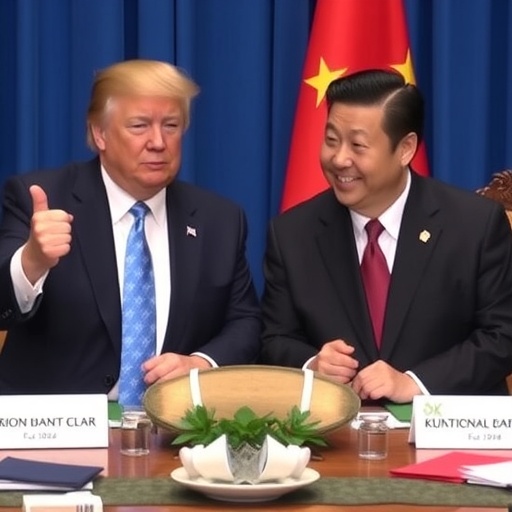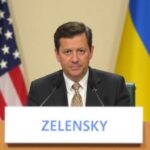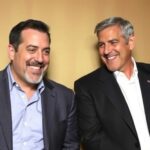Trump Pledges to Urge Xi Jinping for Jimmy Lai’s Release in High-Stakes Summit Over Hong Kong Human Rights
In a striking display of U.S. commitment to global human rights, President Donald Trump has vowed to personally press Chinese President Xi Jinping for the immediate release of Hong Kong media mogul Jimmy Lai during their anticipated bilateral meeting later this year. The announcement comes amid mounting pressure from more than 30 bipartisan U.S. lawmakers, who have highlighted Lai’s rapidly deteriorating health after over four years in solitary confinement, spotlighting the ongoing crackdown on press freedom in Hong Kong.
Trump‘s pledge, delivered during a White House press briefing on Tuesday, underscores a renewed focus on human rights as a cornerstone of U.S.-China diplomacy. “Jimmy Lai is a fighter for truth and democracy, and I’m going to make sure President Xi hears that loud and clear,” Trump stated, emphasizing the personal toll of Lai’s detention on the 76-year-old pro-democracy advocate. This development arrives at a tense moment in U.S.-China relations, strained by trade disputes, technological rivalries, and Beijing’s tightening grip on Hong Kong following the 2020 National Security Law.
The story of Jimmy Lai, founder of the now-defunct Apple Daily newspaper, has become a symbol of resistance against authoritarian overreach. Arrested in August 2020 on charges of collusion with foreign forces and seditious publications, Lai has faced multiple trials, including a recent national security conviction that could lead to life imprisonment. His case has drawn international condemnation, with human rights organizations like Amnesty International labeling it a blatant assault on freedom of expression.
Lawmakers’ Bipartisan Push Ignites Diplomatic Momentum
Over 30 U.S. lawmakers from both sides of the aisle have penned a letter to Trump, urging him to prioritize Lai’s release in any dialogue with Xi Jinping. Led by figures like House Foreign Affairs Committee Chairman Michael McCaul (R-TX) and Ranking Member Gregory Meeks (D-NY), the coalition argues that freeing Lai would signal China’s willingness to ease its suppression of dissent in Hong Kong. “Jimmy Lai’s health is failing, and every day he spends behind bars is a stain on the international community,” McCaul said in a statement. “President Trump has a unique opportunity to champion human rights on the world stage.”
The letter, circulated last week, details Lai’s medical woes, including kidney issues and high blood pressure exacerbated by isolation in Hong Kong’s Stanley Prison. It cites reports from Lai’s family and legal team, who claim the 76-year-old has lost significant weight and suffers from untreated conditions due to restricted medical access. This bipartisan effort reflects a rare unity in Congress on foreign policy, especially concerning Hong Kong, where pro-democracy movements have clashed with Beijing’s authority since the 2019 protests.
Human rights advocates praise the lawmakers’ initiative as a vital counter to Beijing’s narrative. “This is not just about one man; it’s about the soul of Hong Kong’s media landscape,” noted Sarah Brooks, Asia director at Human Rights Watch. The push aligns with broader U.S. legislation, such as the Hong Kong Human Rights and Democracy Act of 2019, which mandates annual assessments of the city’s autonomy and imposes sanctions on officials undermining it.
Statistics underscore the severity of the crackdown: Since 2020, over 10,000 people have been arrested in Hong Kong for political reasons, according to Amnesty International. Media outlets like Apple Daily, once a beacon of independent journalism with a circulation of 500,000, were forced to shutter after assets were frozen and 180 staffers arrested. Lai’s detention fits into this pattern, where journalists face up to 10 years in prison for “seditious” reporting critical of the government.
Jimmy Lai’s Perilous Health Battle in Hong Kong’s Prisons
Jimmy Lai’s health has plummeted since his arrest, turning his case into a humanitarian crisis that transcends politics. Confined to a 6-by-9-foot cell with limited family visits, the media tycoon—once a robust figure known for his sharp suits and sharper editorials—now battles chronic illnesses without adequate care. Medical reports leaked by his supporters reveal diagnoses of diabetes, hypertension, and potential renal failure, conditions worsened by the stress of prolonged trials and solitary confinement.
In a rare court appearance last month, Lai appeared frail, shuffling into the dock with visible tremors. His son, Sebastien Lai, who has campaigned tirelessly from London, described the scene in an emotional interview with CNN: “My father is a shadow of himself. He’s 76, and they’re treating him like a terrorist. This isn’t justice; it’s cruelty.” Sebastien has called on world leaders, including Trump, to treat his father’s release as a non-negotiable demand in talks with Xi Jinping.
Hong Kong’s prison system, criticized by the United Nations for its harsh conditions, offers little relief. Inmates like Lai receive only basic medical checkups, often delayed by bureaucratic hurdles. A 2023 report by the U.S. State Department noted that political prisoners in Hong Kong face “systematic denial of healthcare,” contributing to a 20% rise in reported illnesses among detainees since the security law’s enactment.
Lai’s story is emblematic of broader human rights abuses. Born in mainland China in 1947, he fled to Hong Kong as a teenager and built a retail empire with Giordano before pivoting to journalism. Apple Daily’s bold coverage of the 2019 protests—reaching millions with headlines decrying police brutality—made Lai a target. Charged under colonial-era sedition laws revived by Beijing, his trials have dragged on, with over 100 witnesses and thousands of pages of evidence, yet no verdict on key counts.
International medical experts, including those from the World Medical Association, have urged intervention, warning that Lai’s conditions could become life-threatening without release. “Delaying treatment is tantamount to torture,” stated Dr. Elena Vasquez, a specialist in geriatric care, in a petition signed by 500 global physicians.
U.S.-China Tensions Escalate Over Hong Kong’s Media Crackdown
The Trump-Xi meeting, slated for the G20 summit in November, provides a pivotal arena for addressing Jimmy Lai’s plight amid frosty U.S.-China ties. Trump, who has oscillated between tough rhetoric and deal-making with Xi, now frames human rights as inseparable from economic discussions. During his first term, Trump signed executive orders sanctioning Hong Kong officials, including Chief Executive Carrie Lam, for eroding freedoms—a policy the Biden administration continued with visa bans on judges overseeing Lai’s cases.
Beijing’s response has been defiant. Chinese Foreign Ministry spokesperson Wang Wenbin dismissed U.S. interference last week, stating, “Hong Kong affairs are China’s internal matter. Foreign meddling will not be tolerated.” Yet, behind closed doors, analysts suggest Xi faces domestic pressures, with Hong Kong’s economy—once a gateway to China—suffering a 6.5% GDP contraction in 2022 partly due to emigration of talent fleeing the crackdown.
Human rights groups track over 50 media workers imprisoned in Hong Kong since 2020, a figure that dwarfs pre-law numbers. The city’s press freedom ranking has plummeted from 18th in 2002 to 148th out of 180 countries in Reporters Without Borders’ 2023 index, attributing the slide to self-censorship and exodus of journalists. Lai’s Apple Daily was the last major pro-democracy outlet, its closure leaving a void filled by state-aligned voices.
Trump’s involvement could ripple beyond Lai. Experts like Bonnie Glaser of the German Marshall Fund warn that ignoring human rights risks emboldening Beijing elsewhere, from Xinjiang’s Uyghur camps—where over 1 million are detained, per UN estimates—to Taiwan’s looming threats. “This summit is a litmus test for whether the U.S. will prioritize values over pragmatism,” Glaser observed.
Public opinion in the U.S. leans supportive: A 2023 Pew Research poll found 70% of Americans view China’s human rights record negatively, with Hong Kong cited as a top concern. Trump’s base, including evangelical and conservative factions, has mobilized via petitions amassing 100,000 signatures for Lai’s release, blending faith-based advocacy with anti-communist sentiment.
Global Echoes and Potential Outcomes of the Trump-Xi Dialogue
As the world watches, Jimmy Lai’s fate could redefine U.S.-China engagement. If Trump secures concessions, it might open doors for broader releases, including the 1,800 other political detainees in Hong Kong. Optimists point to past precedents, like the 2016 release of Liu Xiaobo’s widow under international pressure, though skeptics doubt Xi’s willingness amid his consolidation of power.
Stakeholders are gearing up. The U.S. State Department has formed a task force on Hong Kong human rights, integrating Lai’s case into summit prep. Meanwhile, Lai’s legal team prepares appeals to the UN Human Rights Committee, arguing violations of the International Covenant on Civil and Political Rights, which Hong Kong is bound by.
Economically, the stakes are high: U.S.-China trade hit $690 billion in 2022, but tariffs and tech bans persist. Trump has hinted at linking Lai’s release to trade leniency, a tactic he employed in 2019 deals. For Hong Kong residents, now numbering 7.2 million with 500,000 emigrants since 2019, the outcome could restore hope or deepen despair.
Looking ahead, the summit may yield phased agreements—perhaps medical parole for Lai—while signaling U.S. resolve. As Trump prepares, his words resonate: “We’re not backing down on freedom.” The coming months will test whether diplomacy can pierce Beijing’s walls, offering a glimmer for human rights in an era of great power rivalry.
In related developments, European leaders, including UK Prime Minister Rishi Sunak, have echoed calls for Lai’s release, with the EU Parliament passing a resolution last week condemning his trials. This global chorus amplifies pressure on Xi, potentially influencing internal deliberations in Zhongnanhai.
Jimmy Lai’s journey from rags-to-riches entrepreneur to imprisoned icon mirrors Hong Kong’s arc—from British colony to semi-autonomous hub, now under Beijing’s shadow. His writings, smuggled from prison, continue to inspire: “Truth is the only weapon against tyranny.” As Trump and Xi convene, Lai’s voice may yet echo in the halls of power, challenging the narrative of inevitable authoritarian triumph.








